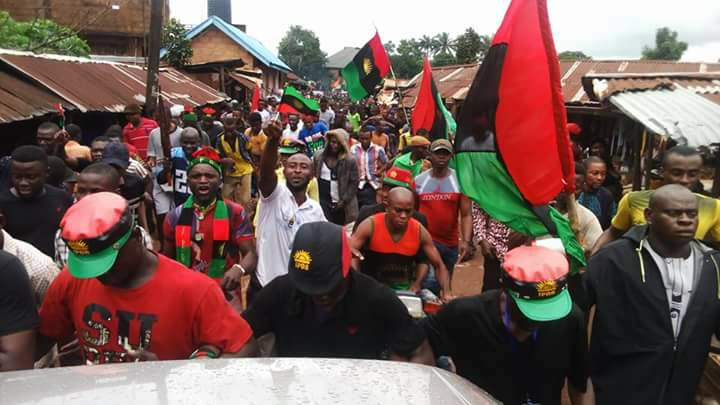
THE interdicted Indigenous People of Biafra (IPOB), yesterday filed an application at the Court of Appeal seeking to upturn its proscription and declaration as a terrorist organisation.
The group was legally proscribed last year by Justice Adamu Kafarati of the Federal High Court, in an ex-parte application filed by the Attorney-General of the Federation (AGF) and Minister of Justice, Abubakar Malami (SAN).
On January 18, Justice Kafarati rejected a motion by IPOB, seeking among others, the reversal of the order.
But on Thursday (1/3/2018) the outlawed organisation urged the Court of Appeal to set aside the entire decision by the Federal High Court, including the order proscribing it and declaring it a terrorist group.
The application was filed by their lawyer, Ifeanyi Ejiofor.
In the appeal which has five grounds, the group argued that the mandatory statutory condition requiring the President’s approval, under Section 2 (1) (C) of the Terrorism (Prevention) (Amendment) Act, 2013, was not met.
It also argued that the memo purportedly giving an approval to the AGF’s request for the proscription of IPOB was signed by the Chief of Staff to the President, Mr. Abba Kyari, instead of President Muhammadu Buhari himself as stipulated by law.
“The trial judge erred in law, when he ruled that the mandatory statutory condition requiring president’s approval, under Section 2 (1) (C) of the Terrorism (Prevention) (Amendment) Act, 2013, was satisfied, on the authority of the Memo of the Honourable Attorney General of the Federation to the President dated September 15, 2017, thereby occasioning a miscarriage of justice.
A cursory look at the Memo of the Attorney General of the Federation dated 15th day of September 2017, addressed to President Muhammadu Buhari, being relied upon or referred to by the learned trial judge, as constituting the mandatory President’s approval granted before an application Exparte for the proscription of the appellant’s activities and its designation as terrorist organisation, was made to the court, shows that it is a mere memo from the Attorney General of the Federation to the President requesting for the said President’s approval, prescribed under Section 2 (1)(C) of the Terrorism Prevention (Amendment) Act, 2013, and not the mandatory President’s approval envisaged under the Act.
“The purported President’s approval dated the September 18, 2017 addressed to the Hon. Attorney General of the Federation & Minister of Justice, captioned “Approval of the President, Commander-In-chief of the Armed Forces for the declaration/proscription of Indigenous People of Biafra (IPOB) as a Terrorist Organization pursuant to section 2(I) (A) (B) & (C) of the Terrorism Prevention (Amendment) Act 2013”, was signed by ABBA KYARI, designated as Chief of Staff to the President, and was not signed by the President as required under Section 2 (1)(C) of the Terrorism Prevention (Amendment) Act, 2013.
“Under Section 40 of the Terrorism Prevention (Amendment) Act, 2013, which deals with the interpretation of words or phrases, the word “President” as used in the Act, refers and only means the President of the Federal Republic of Nigeria, and acts specified under the Terrorism Prevention (Amendment) Act to be done by the President must be done by the President himself, the Act does not provide for this specialised power to be delegated to any officer, staff or personnel of the President to act, on behalf of the President.
“The important condition that the President will have to give his approval was neither satisfied by the Attorney General’s memo of September 15, 2017 nor corrected by the purported approval signed by the Chief of Staff to the President.
“There was no valid approval given by the President in the Memo, in satisfaction of the mandatory requirement under section 2 (1)(C) of the Terrorism Prevention Amendment Act, 2013,” it said.
The appellant argued in the second ground of appeal that “the learned trial judge erred in law, when upon his formulation of issues arising for determination in the ruling delivered on the January 18, 2018, and in consideration therefore, arrived on findings of facts that were grossly faulted by non-evaluation of affidavit evidence placed before the court, and recondite issues of law set out for the trial court’s determination, by the appellant; thereby occasioning a miscarriage of justice.”








